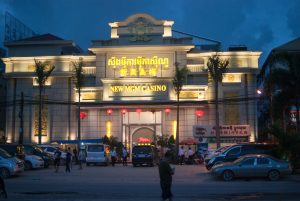Earlier this week, Cambodia’s parliament passed its long-awaited gambling bill, which will seek to impose some semblance of order on the country’s runaway casino sector.
The law, which was approved by the Cambodian cabinet in July of last year and passed by the National Assembly on October 5, contains a range of provisions designed to tighten the government’s control over the industry.
In the words of Cambodian Finance Minister Aun Pornmoniroth, who spoke in parliament prior to the bill’s passage, “The law is aimed at further strengthening the management of commercial gaming facilities in Cambodia so as to contribute to boosting economic growth, promoting tourism, increasing tax revenue as well as maintaining social safety and security.”
Among the regulatory controls contained in the new Law on Commercial Gambling Management are the implementation of clearly designated gambling zones and the establishment of minimum investment requirements for any businesses looking to operate casinos in Cambodia. The law also contains additional measures to protect the industry against money laundering and the financing of terrorism.
The law comes not a moment too soon, given the recent explosion of casinos and online gambling operations, much of it driven by a surge in investment from China. In Cambodia, casinos are licensed to operate in order to attract foreign tourists, and locals are not permitted to gamble there. A total of 193 casinos are currently licensed to operate in the country.
The greatest hub of Chinese gambling operations has been in Sihanoukville, a sleep coastal city once popular with Western backpackers. Between 2016 and 2018, the city saw investments of around $1 billion, much of it from China. The injection of Chinese cash transformed Sihanoukville into a raucous, neon-lit boom town.
Before the coronavirus pandemic, Sihanoukville was home to around 50 Chinese-owned casinos, and dozens of high-rise hotel and apartment complexes. The city was directly linked to 27 destinations in mainland China, where gambling is banned outside Macao. The city and other parts of Cambodia have also become a hotspot for Chinese online gambling operations.
The unrestricted gambling boom attracted tens of thousands of Chinese nationals, who promptly set up restaurants, tourist agencies, and other small businesses. The new casinos were accompanied by a steep rise in violent crime, drug trafficking and environmental despoliation. On Facebook, Cambodian citizens shared videos documenting the actions of badly behaved Chinese tourists, while local media reported gamblers being detained and tortured by casino management after racking up large gambling debts. The result was a rise in anti-Chinese attitudes among the Cambodian public, which threatened to upset the close relationship between Beijing and Phnom Penh.
Prior to this week’s passage of the new commercial gambling law, the Cambodian government had taken measures to impose order on the Chinese-led gambling boom. Last year, at Beijing’s urging, the government imposed a ban on the issuance of licenses for online gaming operations, which led to an exodus of Chinese nationals from Sihanoukville. The city’s gambling and construction boom has since ground to a halt due to the COVID-19 pandemic, although eight casinos in Sihanoukville have since been permitted to reopen as Cambodia contemplates a resumption of foreign tourist arrivals.
Cambodian new gambling law represents a further attempt to extend the government’s control over the unruly sector. The perennial question in Cambodia, however, is whether and to what extent the law will actually be implemented. While Cambodia and its Chinese patron both have strong incentives to curb the most negative effects of China’s rising investment presence in the country, establishing full authority over the country’s casino sector might be a bridge too far.

































